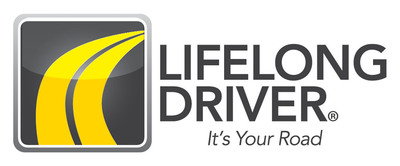ELK GROVE, Calif., Oct. 17, 2017 /PRNewswire/ -- ADEPT Driver, a research and development company that created teenSMART and other proven crash avoidance training programs, warned about the increased risks teen drivers face due to technology embedded in vehicles. ADEPT Driver issued the warning during National Teen Driver Safety Week, October 15 – 21.
Dr. Richard Harkness, CEO of ADEPT Driver said, "Teen drivers have grown up with technology an arm's length away. But infotainment systems and self-driving technology in cars today increase risk on the road. Using technology that is now built in to many vehicle consoles while driving is proven to lead to distracted driving, which can lead to tragic consequences. The increasing prevalence of semi-autonomous and autonomous vehicles adds additional hazards. Teen drivers are three times more likely than adults to be involved in a deadly crash. The risks associated with technology embedded in newer cars make it essential that teens learn to stay focused while driving and how to avoid collisions. Teen Driver Safety Week reminds all of us to drive safely by turning off the in-car infotainment and staying alert to avoid self-driving car malfunctions and other hazards."
New research commissioned by the AAA Foundation for Traffic Safety found that infotainment systems in cars increase distracted driving. In-vehicle infotainment systems take drivers' eyes and attention off the road and hands off the wheel for potentially dangerous periods of time. Drivers using technologies built in to cars like voice-based and touch screen features were visually and mentally distracted for more than 40 seconds when completing tasks like programming navigation or sending a text message. Removing your eyes from the road for just two seconds doubles the risk for a crash, according to previous research.
At the same time, autonomous and semi-autonomous vehicles pose new risks. Many new cars sold today have technologies that take over driver controls, and some vehicles attempt to drive themselves under certain conditions. While the percentage of these cars is relatively small today, they are growing at a dramatic rate. According to the National Highway Traffic Safety Administration, in five years over half of the cars on the road are forecasted to have some self-driving features.
"One of the greatest concerns about the new technology is that drivers will become complacent and rely on technology that is not perfected yet," said Dr. Harkness. "The equipment in vehicles with semi-autonomous driving technology can fail, get confused or malfunction, causing the car to weave within the lane, drift into oncoming traffic, not stop when needed, or accelerate when it shouldn't. These unexpected failures require the driver to quickly take control of the vehicle when a system doesn't work properly."
ADEPT Driver's new video gives drivers tips on how to avoid collisions while sharing the road with cars that have varying levels of autonomous technology.
ADEPT Driver encourages teen drivers to learn about the ways that safe driving can be compromised. ADEPT created a risk calculator app called the Risk-O-lator.™ Using the Risk-O-lator, teens can test their knowledge about risky driving behavior. The Risk-O-lator calculates how risks for teen drivers are increased and compounded by activities such as texting while driving, speeding, tailgating, driving at night, or driving with other teens in the car. Using the Risk-O-lator, teen drivers can determine how taking multiple risks at the same time, such as texting and speeding, can significantly increase the chance that a teen will be involved in a collision. The Risk-O-lator app is available for free through Google Play and the Apple App Store.
ADEPT Driver created teenSMART, a crash reduction program that targets the leading causes of car crashes for teen drivers and teaches teen drivers key crash avoidance skills which are essential in an era of evolving auto technology.
"We need to keep the neurocognitive pathways associated with visual awareness well exercised during this transition to self-driving vehicles," said Dr. Harkness. "This will be critical to maximizing safety as the new technologies emerge over the next decade or longer."
Teens that complete teenSMART have fewer crashes with less severe outcomes and often receive substantial insurance discounts. To learn more about teenSMART, visit teenSMARTDriving.com.
Contact: Dr. Richard Harkness, ADEPT Driver
Phone: 916-509-8012
Email: [email protected]
SOURCE ADEPT Driver
Related Links
WANT YOUR COMPANY'S NEWS FEATURED ON PRNEWSWIRE.COM?
Newsrooms &
Influencers
Digital Media
Outlets
Journalists
Opted In


Share this article